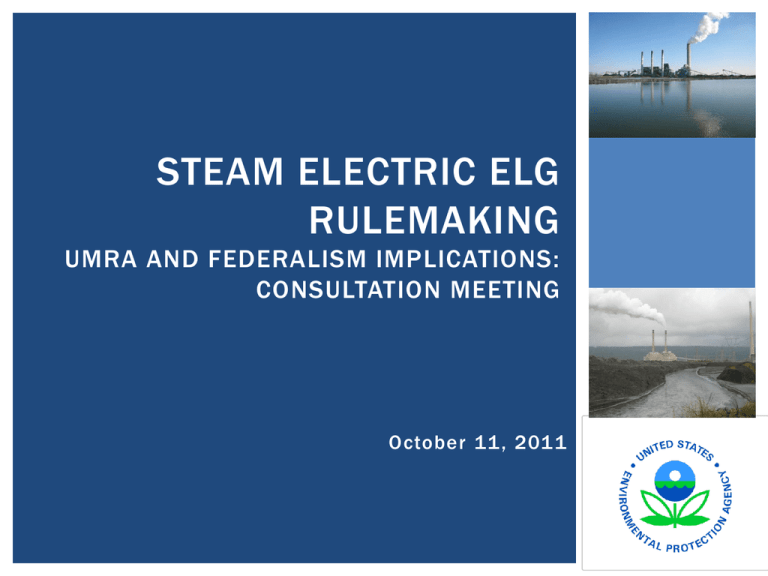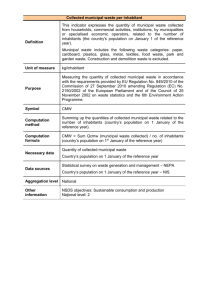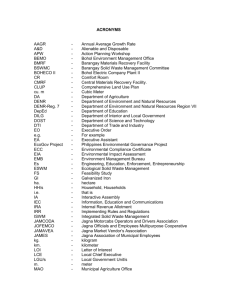Analysis of the Very Short Run Impacts on Energy Consuming
advertisement

STEAM ELECTRIC ELG RULEMAKING UMRA AND FEDERALISM IMPLICATIONS: CONSULTATION MEETING October 11 , 2011 AGENDA Background Timeline Profile of Potentially Affected Entities Considerations of Rulemaking Appendix - List of Potentially Affected Entities 2 BACKGROUND Ef fluent Limitations Guidelines (ELG) National standards, based on performance of treatment and control technologies, for wastewater discharges to surface water and municipal sewage treatment plants Developed on an industry -by-industry basis Represent pollutant reductions that are economically achievable for an industry using the best available technology. ELG implementation Direct dischargers: Implemented through National Pollutant Discharge Elimination System (NPDES) program Indirect dischargers: Implemented through national pretreatment program 3 BACKGROUND ( C ON T ’D) Steam Electric Power Generating ELG (40 CFR 423): Facilities “primarily engaged in the generation of electricity for distribution and sale which results primarily from a process utilizing fossil-type fuel (coal, oil, or gas) or nuclear fuel in conjunction with a thermal cycle employing the steam water system as the thermodynamic medium.” Relevance to State, local and tribal governments As steam electric plant owners (e.g., municipal utilities) As regulators (e.g., NPDES program implementation) 4 TIMELINE 1982: EPA finalizes current ef fluent guidelines 2005: Annual ELG review highlights Steam Electric industr y as major contributor of toxic and nonconventional pollutants Significant process and technology changes since 1982 Fall 2009 Detailed Study completed EPA announces its intent to update the effluent guidelines Summer 2010: Information Collection Request (ICR) Detailed questionnaire sent to 733 facilities, out of approximately 1,200 fossil and nuclear-fueled steam electric power plants All coal- and petroleum coke-fired units and sample of oil, natural gas, and nuclear units Gather technical information about plant processes, effluent and waste characteristics and financial/economic data July 201 2: Proposed regulation Januar y 2014: Final regulation 2014 – 2019: Implement new requirements through 5 -year NPDES permit cycle 5 PROFILE OF STEAM ELECTRIC INDUSTRY Approx i m ately 5 0 0 pl a n t s w i t h c o a l -fire d un i t s Steam Electric Plants, by Fuel Many steam-fueled generating units are “base-load” with generally high capacity factors Account for approximately 48% of nationwide net generation ~ 4 0 pl a n t s w i t h o i l - fired un i t s Many oil-fired generating units are peaking units with low capacity utilization Approximately 1 percent of nationwide net generation ~ 2 0 0 pl a n t s w i t h n a t ura l g a s - fired un i t s 22% of nationwide net generation 6 3 n uc l e ar pl a n t s 19% of nationwide net generation Fo s sil -fuele d s te a m - t urbine g e n e rat ing un i t s ra n g e i n s i z e ( n a mepla te c a pa c i t y ) fro m 1 M W to m o re t h a n 1 , 0 0 0 M W 6 PROFILE OF POTENTIALLY AFFECTED ENTITIES Industry includes investor -owned, publicly -owned, and rural cooperatives Investor-owned utilities: For-profit businesses organized as individual corporations or holding companies Publicly-owned electric utilities: State authorities, municipalities, political subdivisions, and Federally -owned facilities Cooperative electric utilities (“coops”): Member -owned entities established under the Rural Electrification Act of 1936, provide electricity to small rural and farming communities Plants often have multiple owners with varying shares in dif ferent generation units 7 PROFILE OF PLANTS OWNED BY GOVERNMENT ENTITIES AND COOPERATIVES Based on sur vey responses ( out of a total of 677 plants within the scope of the sur vey ): 158 states/local governments and cooperatives are estimated to be potentially impacted by the regulation These entities have ownership (or part ownership) in 182 plants A government entities is the dominant owner in 152 sur veyed plants Government-Owned Plants by Fuel Type Government-Owned Plants by Nameplate Capacity The 1 82 government -owned plants in sur vey account for ~100,000 MW in aggregate nameplate power generation capacity Plant nameplate power generation capacities range from less than 20MW to over 3,300MW (Median 400MW) DRAFT - 5/22/2011 8 CONSIDERATIONS OF RULEMAKING Scope of rulemaking Flue gas desulfurization (FGD) wastewater Ash handling (fly ash, bottom ash) Landfill operations (leachate) Other waste streams, if warranted Subcategorization, if warranted Coordination with other EPA rules affecting Steam Electric industry Energy supply impacts Supply impacts on marginal, low -capacity factor, peaking units Compliance could result in closure Some oil-fired plants are required to have oil capability for times of natural gas shortages (e.g., adverse weather conditions) Small Business Regulatory Enforcement Fairness Act (SBREFA), Federalism, Unfunded Mandate Reform Act, and Tribal considerations Environmental Justice and Children’s Health considerations 9 UMRA AND FEDERALISM UMRA: “Federal mandates” that might result in expenditures by State, local, and Tribal governments, in the aggregate, or by the private sector, of $100 million* or more in any one year UMRA analysis Include State, local, and Tribal governments (exclude Federal governments) Determine the domestic parent entity(ies) for each plant that will incur direct compliance costs Calculate parent entity-level compliance costs Evaluate magnitude of the regulatory impact on government entities, considering: Compliance costs incurred by government entities owning facilities Administrative costs incurred to implement the revised Steam Electric ELGs. * Indexed. The current threshold is $147 million. 10 UMRA AND FEDERALISM (CONT’D) Federalism: “Substantial direct ef fects on the States, on the relationship between the national government and the States, or on the distribution of power and responsibilities among the various levels of government .” (E.O. 13132) EPA’s Numerical tests for “substantial direct ef fects” Annualized direct compliance costs to state and local governments $25 million or more, in the aggregate, in any one year Annualized direct compliance costs to state and local governments equal or greater than 1% of annual revenues of small governments 11 IDENTIFICATION OF POTENTIALLY AFFECTED GOVERNMENT ENTITIES EPA identified facilities using the questionnaire responses. Ownership shares for all entities Industry sector (NAICS code), total electric generation, revenue, and employment data obtained for parent entities Population data from U.S. Census Complemented with data from EIA, FERC, Dun & Bradstreet, Standard & Poor’s, and American Business Information Additional screening for small government entities Preliminary findings (based on survey of 677 Steam Electric plants): 158 states/local governments and cooperatives are estimated to be potentially impacted by the regulation, based on ownership (or part ownership) in 182 plants Government entity is the dominant owner (largest ownership share) in 152 of these plants 108 small government or cooperative entities have ownership shares in 121 steam electric plants 12 QUESTIONS? Project Lead: Ron Jordan, 202-566-1003, jordan.ronald@epa.gov Federalism Contacts: James Covington, 202-566-1034, covington.james@epa.gov Andrew Hanson, 202-564-3664, hanson.andrew@epa.gov 13 POTENTIALLY AFFECTED STATE AND LOCAL GOVERNMENT ENTITIES Appendix 14 STATE AND LOCAL GOVERNMENTS POTENTIALLY SUBJECT TO REGULATION Non-Small State/Regional Governments Name State Number of Plants Central Valley Financing Authority CA 1 Kansas City Board of Public Utilities KS 2 Lower Colorado River Authority TX 3 Massachusetts Municipal Wholesale Electric Company MA 1 Municipal Electric Authority of Georgia GA 4 Municipal Energy Agency of Nebraska NE 2 Nebraska Public Power District NE 3 North Carolina Eastern Municipal Power Agency NC 2 Oklahoma Municipal Power Authority OK 1 Platte River Power Authority CO 1 Salt River Project Agricultural Improvement and Power District AZ 8 Santee Cooper SC 4 Southern Minnesota Municipal Power Agency MN 1 State of California, Department of Water Resources CA 1 Texas Municipal Power Agency TX 1 Utah Municipal Power Agency UT 2 Preliminary list based on plants covered by survey 15 STATE AND LOCAL GOVERNMENTS POTENTIALLY SUBJECT TO REGULATION (CONT’D) Non-Small Municipal Governments State Number of Plants City of Corona City of Glendale City of Los Angeles, CA City of Pasadena - Department of Water and Power, Power Division LADWP -Power System Colorado Springs Utilities City of Gainesville,Gainesville Regional Utilities City of Tallahassee Dept. of Electric Utilities, City of Lakeland JEA Orlando Utilites Commission Ames Municipal Electric Services Springfield, Illinois- Office of Public Utilities Owensboro Municipal Utilities City of Lafayette, LA Taunton Municipal Lighting Plant Lansing Board of Water and Light Rochester Public Utilities City of Columbia Missouri City of Independence Name CA CA CA CA CA CO FL FL FL FL FL IA IL KY LA MA MI MN MO MO 1 1 2 1 1 3 2 2 1 3 1 1 1 1 1 2 2 1 1 2 City of Springfield, MO Public Works Commission of the City of Fayetteville, NC City of Lincoln, NE Omaha Public Power District (OPPD) City of Vineland City of Hamilton Electric Department Heartland Consumers Power District Brownsville Public Utilities Board City of Austin, TX CPS Energy Garland Power & Light Clark Public Utilities MO NC NE NE NJ OH SD TX TX TX TX WA 2 1 2 2 1 1 1 3 1 3 2 1 Preliminary list based on plants covered by survey 16 STATE AND LOCAL GOVERNMENTS POTENTIALLY SUBJECT TO REGULATION (CONT’D) Small Municipal Governments Town/City/Municipality City of Lamar City of Dover City of Dalton, GA Crisp County Power Commission Alta Municipal Utilities Atlantic, IA City of Algona, Iowa City of Bancroft, IA City of Elridge, IA City of Harlan, IA City of Milford, IA City of Montezuma, IA City of Pella, IA City of Tipton, IA Coon Rapids, IA Graettinger, IA Laurens, IA Muscatine Power and Water New Hampton, IA Pella, City of Spencer, IA Sumner, IA The Municipal Electric Utility of the City of Cedar Falls Waverly, IA Webster City, IA West Bend, IA City of Geneseo, IL City of Jasper Crawfordsville Electric Light & Power Logansport Municipal Electric State CO DE GA GA IA IA IA IA IA IA IA IA IA IA IA IA IA IA IA IA IA IA IA IA IA IA IL IN IN IN Number of Plants 1 1 2 1 1 1 1 1 2 1 1 1 1 1 1 1 1 1 1 1 2 1 3 2 1 1 1 1 1 1 Town/City/Municipality Peru Utilities Richmond Power & Light Hudson, MA City of Escanaba City of Grand Haven Board of Light and Power City of Wyandotte, Department of Municipal Service Holland BPW Marquette Board of Light and Power Austin Utilities Hibbing Public Utilities Hutchinson Utilities Comm New Ulm Public Utilities Northern Municipal Power Agency Virginia Public Utilities Willmar Municipal Utilities City of New Madrid, MO MMU Sikeston BMU Clarksdale Public Utilities Greenwood Utilities Commission City of Fremont, Nebraska City of Grand Island Hastings Utilities City of Farmington Electric Utility System Jamestown Board of Public Utilities City of Dover - Ohio City of Orrville City of Painesville City of Shelby Manitowoc Public Utilities State IN IN MA MI MI MI MI MI MN MN MN MN MN MN MN MO MO MO MS MS NE NE NE NM NY OH OH OH OH WI Number of Plants 1 1 1 1 1 1 1 1 1 1 1 1 1 1 1 1 1 1 1 1 1 2 1 1 1 1 1 1 1 1 Preliminary list based on plants covered by survey 17 STATE AND LOCAL GOVERNMENTS POTENTIALLY SUBJECT TO REGULATION (CONT’D) Non-Small Cooperatives Name PowerSouth Energy Cooperative Arkansas Electric Cooperative Corporation Southern California Public Power Authority Tri-State Generation and Transmission Association, Inc. Seminole Electric Cooperative, Inc. MEAG Power Oglethorpe Power Corporation Hoosier Energy REC, Inc Indiana Municipal Power Agency Wabash Valley Power Association, Inc. Big Rivers Electric Corporation East Kentucky Power Co- operative Great River Energy Associated Electric Cooperative, Inc. Missouri River Energy Services South Mississippi Electric Power Association Basin Electric Power Cooperative Minnkota Power Cooperative, Inc. Buckeye Power, Inc. GRDA WFEC Brazos Electric Power Cooperative Deseret Generation & Transmission Cooperative Intermountain Power Agency Utah Associated Municipal Power Systems Dairyland Power Cooperative WPPI Energy State Number of Plants AL AR CA CO FL GA GA IN IN IN KY KY MN MO MO MS ND ND OH OK OK TX UT UT UT WI WI 2 2 1 5 1 1 3 3 2 3 5 3 2 3 1 1 3 1 1 1 3 1 2 1 1 3 1 Preliminary list based on plants covered by survey 18 STATE AND LOCAL GOVERNMENTS POTENTIALLY SUBJECT TO REGULATION (CONT’D) Small Cooperatives Name Golden Valley Electric Association, Inc. Arizona Electric Power Coop, Inc. Kauai Island Utility Cooperative Central Iowa Power Cooperative Corn Belt Power Cooperative Northwest Iowa Power Cooperative Illinois Municipal Electric Agency Prairie Power Inc Southern Illinois Power Cooperative Kansas Electric Power Cooperative Mid-Kansas Electric Company, LLC Sunflower Electric Power Corporation Louisiana Energy & Power Authority Michigan South Central Power Agency MMPA Central Electric Power Cooperative Square Butte Electric Cooperative Power Resources Cooperative San Miguel Electric Cooperative, Inc. Wyoming Municipal Power Agency State Number of Plants AK AZ HI IA IA IA IL IL IL KS KS KS LA MI MN MO ND OR TX WY 1 1 1 3 3 1 1 1 1 1 1 2 2 1 1 1 1 1 1 1 Preliminary list based on plants covered by survey 19 STEAM ELECTRIC ELG RULEMAKING UMRA AND FEDERALISM IMPLICATIONS: CONSULTATION MEETING SUPPLEMENTAL INFORMATION October 11 , 2011 TECHNOLOGIES UNDER CONSIDERATION & PRELIMINARY COMPLIANCE COSTS ( C o s t s fo r p lan t c ap ac it y o f 5 0 - 6 0 0 M W) FGD wastewater Option Option Option Option 1: 2: 3: 4: No change to ELG (No cost) Chemical precipitation ($0.9 - $3.2 million/yr) Chemical precipitation + Biological ($1.7 - $4.5 million/yr) Chemical precipitation + Evaporation ($4.2 - $10.2 million/yr) Leachate from landfills/ponds containing coal combustion residues Option 1: No change to ELG (No cost) Option 2: Chemical precipitation ($0.5 - $1.6 million/yr) Option 3: Chemical precipitation + Biological ($1.1 - $2.5 million/yr) Note: The costs shown are for a new treatment system and do not take into account the savings associated with ceasing operation of an existing treatment system (e.g., avoiding construction of a new settling pond or ceasing operation of an existing settling pond designed to comply with current effluent limits for total suspended solids). A-1 TECHNOLOGIES UNDER CONSIDERATION & PRELIMINARY COMPLIANCE COSTS ( C o s t s fo r p lan t c ap ac it y o f 5 0 - 6 0 0 M W) Fly ash Option 1: No change to ELG (No cost) Option 2: Zero discharge of fly ash transport water, based on conversion to dry fly ash transport ($0.3 - $2.2 million/yr) Bottom ash Option 1: Option 2: complete transport No change to ELG (No cost) Zero discharge of bottom ash transport water, based on either recycle of transport water or conversion to dry bottom ash ($0.9 - $3 million/yr) Note: The costs shown are for a new treatment system do not take into account the savings associated with ceasing operation of an existing treatment system (e.g., avoiding construction of a new settling pond or ceasing operation of an existing settling pond designed to comply with current effluent limits for total suspended solids). A-2 TECHNOLOGIES UNDER CONSIDERATION & PRELIMINARY COMPLIANCE COSTS ( C o s t s fo r p lan t c ap ac it y o f 5 0 - 6 0 0 M W) Flue gas mercury control wastes (e.g., activated carbon injection) Option 1: No change to ELG (no cost) Option 2: Zero discharge, based on dry handling practices (minimal cost, if any) Gasification wastewater Option 1: No change to ELG (no cost) Option 2: Evaporation (no cost) Option 3: Evaporation + Cyanide destruction (minimal cost) A-3




